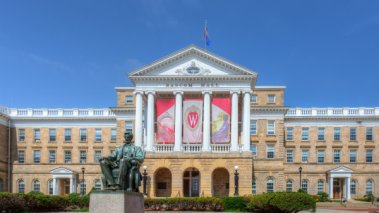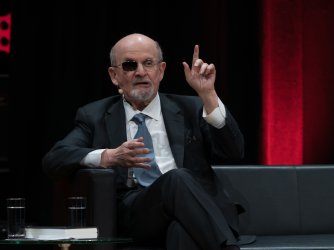Table of Contents
Don’t fall in love with the club that will be used to beat you over the head

Bascom Hall at University of Wisconsin-Madison. (Ken Wolter/Shutterstock)
It seems like every time a faculty member at a college or university says something controversial, someone responds with a public demand that the institution punish the professor. And way too often politicians are among the chorus of voices calling for punitive responses to unpopular expression. Sometimes they are even at the center of campaigns to get professors fired.
Censorship is not a tool exclusively used by one side of the political spectrum — people tend to censor the ideas they find most abhorrent, regardless of where they stand politically.
Just this week, Alabama Republican Rep. Mo Brooks took to Twitter to urge Duke University to fire a professor who argued that President Trump was as destructive a person in this century as Hitler, Stalin, and Mao were in the last century. Last year, Assemblyman James Gallagher, a California Republican, introduced a resolution urging the University of California, Davis to fire a professor after the academic’s public comments from 2014 and 2015 surfaced in which he called for police to be killed. In 2016, Republican legislators in Wisconsin threatened to withhold funding from the University of Wisconsin-Madison if a scheduled course on racism, called “The Problem with Whiteness,” wasn’t cancelled. Back in 2013, Republican Kansas legislators threatened the University of Kansas with budget cuts if professor David Guth remained on faculty after he blamed the NRA for the mass shooting at the Washington Navy Yard on Twitter.
Republicans concerned about the scarcity of conservatives in academia should think twice before trying to empower campus administrators to punish controversial arguments. Once administrators have that power, they will use it against the views that they find offensive. Just ask conservative professors Mike Adams, Jim Enstrom, or John McAdams. Conservatives should be wary of falling in love with the club that will be used to beat them over the head.
But Republican lawmakers aren’t the only ones who have tried to get professors punished for expressing views they find offensive. Democrats have been in on the action too! After all, censorship is not a tool exclusively used by one side of the political spectrum — people tend to censor the ideas they find most abhorrent, regardless of where they stand politically.
Back in 2004, then-Rep. Anthony Weiner wrote a letter to Columbia University urging the termination of professor Joseph Massad for his criticisms of Israel. Earlier this year, State Rep. Bee Nguyen, a Democrat from Georgia, suggested that Georgia Gwinnett College punish history professor Fang Zhou for his harsh criticisms of illegal immigration.
When we normalize political litmus tests for faculty members, we all lose. As The Atlantic columnist Conor Friedersdorf aptly observed:
[C]onservatives, liberals, and libertarians should all be able to agree that consistent, principled defenses of free speech norms are indispensable at institutions of higher education, and that their absence is most damaging to marginalized students. Uniting against illiberalism on the right and left is the best course. Otherwise, political groups will waste their efforts on an interminable fight to censor one another, instead of defending the values that serve them all.
While politicians should avoid demanding that institutions retaliate against professors for protected speech, they do not need to stay silent when they find the views of a professor abhorrent. Like everyone else, elected officials also enjoy First Amendment rights.
Instead, they should simply make their case on the merits for why the faculty member’s viewpoint is wrong. College students, like most adults, are capable of identifying unpersuasive arguments and don’t need them filtered out.
Politicians who want to go on the record contesting an academic’s views should generally avoid rhetoric implying that controversial opinions are out of bounds, have no place at a university, or warrant full public ostracization. Instead, they should simply make their case on the merits for why the faculty member’s viewpoint is wrong. College students, like most adults, are capable of identifying unpersuasive arguments and don’t need them filtered out.
This is the approach Rep. Dan Crenshaw took after Saturday Night Live cast member Pete Davidson made light of the eye patch the Congressman wears as a result of an injury he suffered while serving in Afghanistan. Crenshaw could have given in to outrage and demanded an apology, or worse, the comedian’s termination, but instead, he took the high road. Explaining his decision, Crenshaw commented:
I want us to get away from this culture where we demand apologies every time someone misspeaks. I think that would be very healthy for our nation to go in that direction. We don’t need to be outwardly outraged. I don’t need to demand apologies from them. They can do whatever they want.
Vigorously debating controversial views and putting them under scrutiny is necessary in academia. Faculty members should not be shielded from criticisms for the ideas they espouse. But legislators should be mindful that when they use their voices to demand punishment for faculty views they abhor, they feed this notion that controversial viewpoints are unwelcome on college campuses. When faculty members self-censor because they have to consider the political implications of their arguments, free speech and academic freedom are threatened.
Lawmakers would be wise to avoid contributing to this problem and to instead welcome the conversations that competing views produce.
Recent Articles
FIRE’s award-winning Newsdesk covers the free speech news you need to stay informed.

No, the Berkeley Law student didn’t have a First Amendment right to interrupt the dean’s backyard party

Salman Rushdie calls out left-wing censorship in CBS interview

Falsely claiming a First Amendment right at a dinner party at private home — FAN 419.1
